In July I backed the Kickstarters for The Resistance - Hostile Intent
& Hidden Agenda and Flash Point: Honor & Duty. My copies have now
arrived.
Honor & Duty first. The main content is a new double-sided
board, the underground station and airfield that I was involved in
playtesting (designed by Lutz Pietschker, who's pretty good at this).
There are also more fire/smoke tokens (always welcome) and foam tokens
(used as an alternative Deck Gun action on the airfield board), and
some deck gun target markers to keep track of what's happening where.
Kickstarter bonuses were a Fire Prevention Officer role, who can move
smoke for 1AP and an un-checked person of interest for 2AP, and a new
attic/basement map board to be combined with other maps. (One could
even have a combined ground floor, attic and basement map, if one
could readily simulate a sixteen-sided die.)
Read more on boardgamegeek.
Hostile Intent and Hidden Agenda come in a single small box, but
one containing an awful lot of stuff. Different parts of it change
the game in different ways, and one certainly wouldn't want to use all
of it at once. (Indeed, I don't think it would be possible.) They are
sensibly sorted into modules.
My copy also contained a full set of new mission and standard role
cards (on the basis that the old ones might be a bit worn and so not
match the new ones), and some alternative art cards for Coup.
The rest of this post won't make much sense unless you're already
familiar with the core rules. There's an explanation of them
here.
Hidden Agenda: Assassin
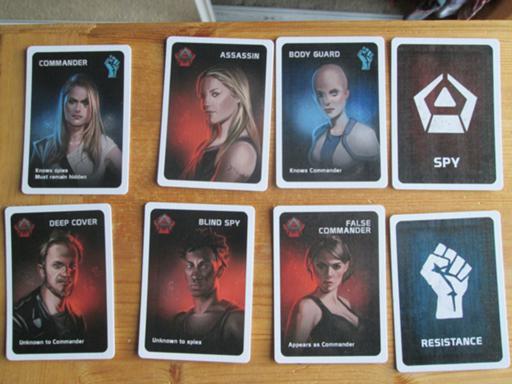
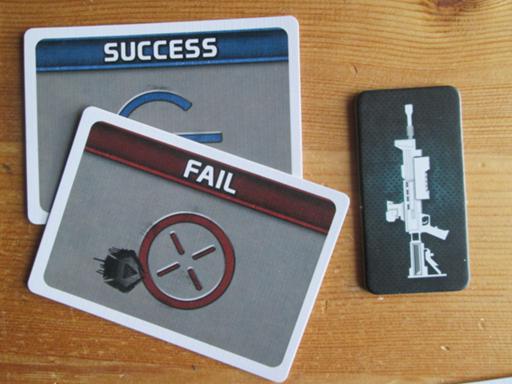
This is basically Merlin/Assassin as seen in The Resistance: Avalon
(indeed, the artwork for the Commander and Assassin are the same as on
the old promo cards for Merlin/Assassin). The Commander knows who the
spies are, but if the Assassin can correctly identify him at the end
of the game then the spies win even if three missions have succeeded.
(The loyalty cards are used in case some other module requires someone
to show their character card to another player: they show the loyalty
card instead, thus revealing their affiliation but not their specific
role.)
The Body Guard (Avalon's Percival) is a rebel who thinks he knows
who the commander is (but the False Commander, Avalon's Morgana,
will also be in play and he doesn't know which is which). The Deep
Cover agent (Avalon's Mordred) is a spy unknown to the Commander;
the Blind Spy (Avalon's Oberon) isn't known to the other spies.
(None of these cards is described in the rules, oddly enough, but the
intent is clear.)
I prefer this approach of rules to the one of named characters in
Avalon. In a resistance organisation, it makes some sense that you
might not really know who's got access to secret information. It makes
less sense that you might not know who is really Percival.
Trapper
This is very simple and needs no extra components. Each mission leader
chooses one more person than the mission would normally require as
part of the team. After all mission cards have been played, the leader
takes one and inspects it; it does not count towards the success or
failure of the mission, and of course it may not be revealed to other
players.
Defector
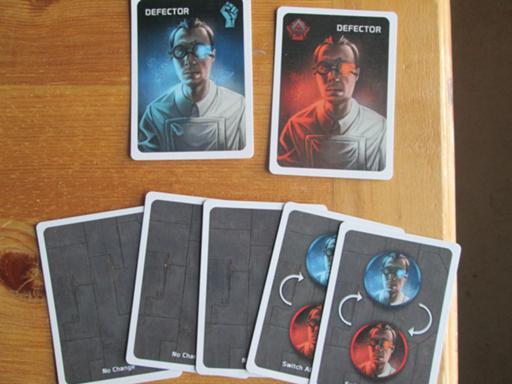
This is Avalon's Lancelot. One spy and one rebel are replaced by the
rebel and spy defectors. The five defector switch cards are shuffled
and placed face down. The spy defector is known to other spies, but
does not know them. (In larger groups, the defectors may know each
other.)
At the start of the third and subsequent rounds, one defector switch
card is turned face up. Each time this happens, the rebel and spy
defectors change allegiance.
Hostile Intent: Hunter
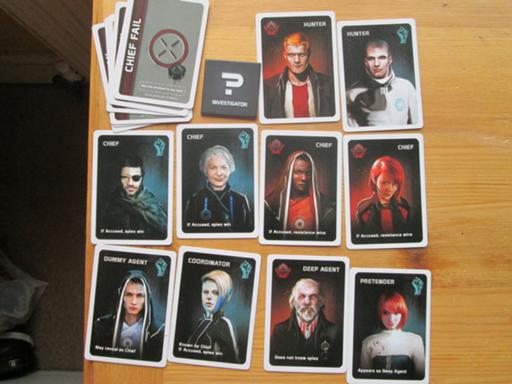
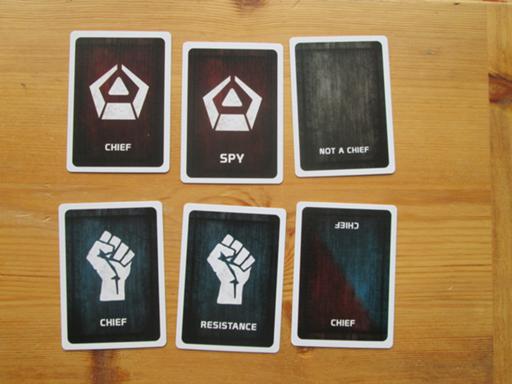
This is conceptually an extension of the Assassin module. Each side
has one Hunter and one Chief (two Chiefs in larger games); the hunters
are trying to identify the chiefs.
Before each mission, the Leader picks a player to be the Investigator
if that mission fails and passes him the Investigator token. The spy
chief cannot play a normal failure card; if he wants to fail a
mission, he must play Chief Fail instead. When that card shows up in
mission results, the spies' hunter may reveal himself and make an
accusation: this will end the game, if he's right, or turn the failed
mission into a success if he's wrong.
If the mission succeeds, the Leader can investigate any player apart
from himself; if it fails, the Investigator does it. The investigated
player reveals his loyalty card to the investigating player, which
will show whether he's a chief and, if so, what side he's on.
After the third successful mission, the resistance hunter reveals
himself and accuses another player of being the spy chief. If he's
right, the game's over and the resistance has won. Otherwise, the mission
becomes a failure and play continues. Similarly after the third failed
mission the spies' hunter reveals himself and makes an accusation.
If this happens after the final mission, accusations fly back and
forth until one of them gets it right.
There are add-on cards to complicate things further. The Resistance
Dummy Agent may show a Chief card when investigated. The Resistance
Coordinator is known to the Resistance Chief(s), but causes a spy win
if accused by the spies' hunter. The Deep Agent doesn't know who the
other spies are. The Pretender (used with the Deep Agent) appears as a
spy to the other spies, but doesn't know who they are. (An optional
rule allows the Deep Agent to Blame another player during team
building, and to swap cards if that player is the Pretender.)
Inquisitor

This is Avalon's Lady of the Lake. After the second, third and
fourth missions the player with the Inquisitor token picks another
player to examine. He sees that player's loyalty card, and passes the
Inquisitor to that player, who can use it on someone else after the
next mission.
Reverser
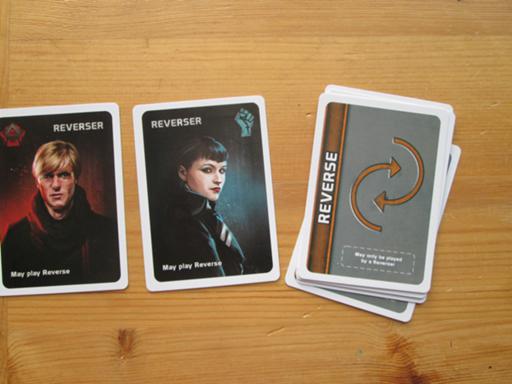
Either or both of the Reversers may be in play, and may play a Reverse
card when on a mission (the spy reverser may not play a normal Fail,
and optionally may not be known to other spies). Each card switches
the result of the mission between success and failure. (It's not
entirely clear what happens if both cards on a two-player mission are
Reverse. I suspect the result is a success.)
Promotional items: Rogue
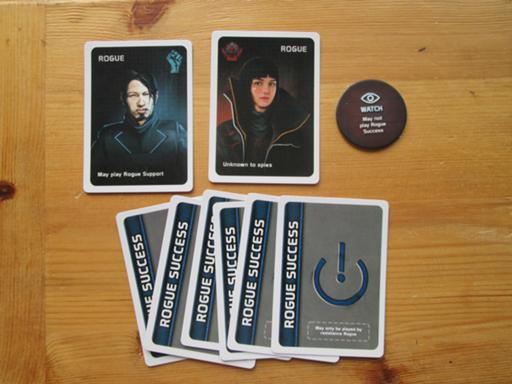
This is part of the Kickstarter bonus. One or both Rogues may be in
play. A spy rogue is unknown to or by other spies, and to the
Commander.
On each mission, the Leader gives out the Watch token to one player;
that player may not play Rogue Success.
The rebel rogue wins if the rebels win, he played rogue success on
that mission, and he's played at least one rogue success before.
The spy rogue wins if the spies win, he played a fail card on the
mission, and he's failed on at least one previous mission.
Sergeant
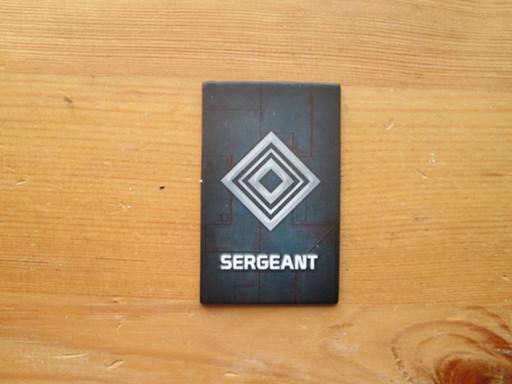
This is a new version of Avalon's Excalibur. The Sergeant is a
mission team member picked by the Leader, and this status is voted on
as part of the mission vote. Once mission cards are played, the
Sergeant may choose one player to switch between success and failure.
The Sergeant sees what the player had originally put down; the other
players don't. This obviously isn't compatible with games that use
special mission cards (Rogue Success, Reverse, Chief Fail).
Most of these modules seem as though they'll work better in bigger
games, and I'll certainly be taking this along to future sessions. I'm
particularly pleased to see more special roles for rebels, since being
a loyal resistance member who has no idea what's going on can get
quite frustrating.
Read more on boardgamegeek
here and
here.
Comments on this post are now closed. If you have particular grounds for adding a late comment, comment on a more recent post quoting the URL of this one.